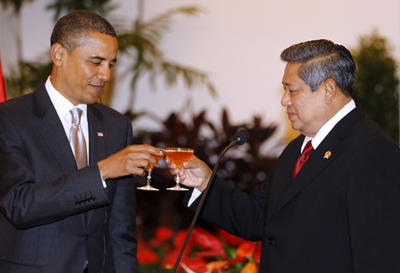As the fourth most populous country in the world, Indonesia would be important simply because of its size independent of its wealth. Size would not count for much, of course, if the polity were crippled by terrorism and poverty. But Indonesia has also confronted both terror and poverty with a determination now grounded in the growing strength of its new democracy in a way that demands both admiration and international respect. It has emerged from the global financial crisis with powerful economic growth that, if not yet knocked off course by the prolongation of industrial country recession, will almost certainly see the per capita incomes of its population double in little more than a decade. Indonesia is also now a member of the G20 and takes new agendas to, and holds new responsibilities in, global councils of governance.
Long perceived as among the more corrupt of countries internationally, Indonesia ranked 143rd in Transparency International’s Corruption Transparency Index, out of 180 or so countries in 2007. In 2010, Indonesia’s rank had climbed to 110th. There has been success in confronting extremist Islamic terrorism, and terrorist cells in Indonesia are in retreat. Only 13.3 per cent of the population lived below the poverty line, down from 17.8 per cent in 2006. And Indonesia’s income per head, at US$3039 according to the World Bank, ranked 92nd in the global league. Indonesia’s share in global income was 1.12 per cent, the 18th largest economy in the world in nominal terms, and the 15th largest in PPP terms, already larger than Australia on this measure. Real GDP is now growing steadily above 6 per cent per year. The literacy rate in Indonesia was 67 per cent in 1980; last year it had risen to 92 per cent. President Susilo Bambang Yudhoyono (SBY) is midway through his second term as Indonesia’s third freely elected president in a democracy that, though not without fragilities, is open, transparent and fair. Indonesia’s government — however constrained by the nature of the coalition on which it is built, the challenge of the policy tasks it faces at home and its parliamentary obligations and responsibilities — is passably competent and clean.
Judging by all the vital signs, the health of the Indonesian economy, polity and society is robust — and Indonesia is ready and able to make a significant contribution to regional and global affairs. With the institutions for democracy and economic growth taking root, the prospect is for rising Indonesian economic and political power in the medium to long term. The implications of this rise are profound, for Indonesia, for Indonesia’s neighbours in East Asia, including Australia, and for the global community.
Last week, CSIS in Jakarta, celebrated its 40th anniversary, and an amazing history of shaping Indonesian thinking about internationally oriented reform and Indonesia’s regional and global roles. What a journey! There has not been a major constructive initiative in Indonesia’s foreign economic policy or regional economic cooperation over these decades on which CSIS (and especially its late Executive Director, Hadi Soesastro) fingerprints are not evident.
Our lead essay, from Dr Sri Mulyani Indrawati (former Indonesian Finance Minister who steered Indonesia through the global financial crisis, and now a Managing Director of the World Bank) provides a powerful statement on Indonesia’s new destiny in international affairs and how it can, at this time, be turned to global good.
Make no mistake, there is still much to be fixed in Indonesia and much to be done. There are the glaring weaknesses in public and social infrastructure that clog Indonesia’s economic arteries and hold it back from an even faster escape from poverty and greater competitiveness in the international economy. Public regulation and governance are a mess. Inefficiency in the delivery of government services and corruption are still rife and difficult to deal with. There is palpable under-investment in human capital. And there is the continuing task of improving agricultural productivity and resilience, requiring greater investment in agriculture.
Yet there is opportunity for big pay-off from investment in Indonesian infrastructure. ‘Investing in quality infrastructure can provide outstanding returns in terms of growth and development outcomes … [but ] … for many developing countries [like Indonesia], financing for critical infrastructure investment is inadequate’, Mulyani says. The World Bank estimates that current infrastructure investment and maintenance needs in developing countries are more than US$900 billion a year, but actual infrastructure spending is only around half that level. Indonesia, working with other G20 members to address these key development challenges, has the potential to provide a strategic international forum to advance its national interests at the same time as supporting its global responsibilities.
The agenda for pro-poor growth in Indonesia and other emerging economies, as Mulyani points out, is a force that can now be brought to bear on turning the global economy away from recession.
The international good will not be delivered without reform at home in developing countries like Indonesia, of the markets that are required for sound infrastructural investment, of the regulatory infrastructure, and of the service sector so that it delivers inclusive growth.
Reform of these institutions and investment in these assets will secure a future in which Indonesia’s power and influence will assuredly grow stronger, in spite of the doubts that some still hold. Alongside similar structural programs in China and India, Indonesia’s commitments can also make an important contribution to boosting confidence in global growth.
Peter Drysdale

